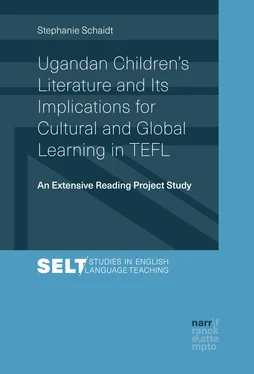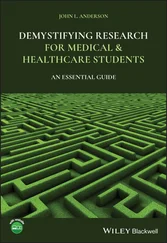Another frequent topic in Ugandan children’s fiction in a realistic mode are school experiences. Particularly in the first years after independence, school stories gained in importance in Uganda. According to Reynolds (2011, p. 81), “the school story is one of the oldest and most fully developed genres associated with children’s literature”. African school stories became popular in the 1960s. The most famous school-boy in Africa is Moses, a creation by Barbara Kimenye. Kimenye who was born and grew up in England considered herself Ugandan by birth (Oldfield, 2013, p. 29). She moved to Uganda in the early 1950s (ibid., p.xvi) where she “integrated fully into the Baganda society” (ibid., p. 193). Kimenye was one of the pioneers in writing for children in East Africa; she “began […] in the mid-1960s and continued writing for juniors and adolescents until she moved to London in the late 1990s” (ibid., p. 189). Today, Kimenye is one of the most widely read writers of children’s fiction in Africa. Her books are read in Uganda, East Africa and even beyond. There are at least eleven Moses stories published by the Oxford Library for Eastern Africa, two by East African Educational Publishers and three by Macmillan Publishers Limited which have been reprinted several times.
All of the titles in the series focus on Moses, a fifteen-year-old Ugandan boy, growing up without parents. He is sent to boarding school by his uncle and aunt. This boarding school, Mukibi’s Educational Institute for the Sons of African Gentlemen, provides the setting for most of the Moses stories. Moses is quite a bold boy who has many different adventures at school while dealing with authoritarian adults. He does not conform to the ideal student which adults have in mind. He is not obedient but instead enjoys playing tricks on his teachers. In the first book of the series, Moses introduces himself in the following way:
I had just been expelled from my sixth school. They sent me back to Uncle Silasi’s house, where I again met with the usual preaching mixed with abuse from him, and the usual floods of tears from his wife, Aunt Damali. Then I was banished to my bedroom while a family council hastily assembled to decide what next to do with me. It was pretty dull being there alone with only a silly old bee trying to bore his way through the window pane for company. But at least I was able to stretch out on a bed and have a peaceful smoke. I would not have minded a glass of beer, too, but there wasn’t much hope of that in my uncle’s house. (Kimenye, 1968a, p. 1)
Also in the other books in the series, Moses and his friends King Kong, Itchy Fingers and Rukia break many school rules. They smoke and drink, secretly sneak out of school, keep a pet snake or gamble. In each book, they play another prank on their teachers.
Because of her both British and Ugandan background, Kimenye’s stories are informed by experiences in both countries. She has thus created hybrid literature. Kimenye only wrote when she stayed in Uganda. She got her inspirations from everyday Ugandan life. Therefore, her stories, on the one hand, reflect upon Ugandan reality. On the other hand, Kimenye also confirmed in an interview that her writing was influenced by English authors. She was inspired by Enid Blyton’s Famous Five series and also Richmal Crompton’s William stories (Oldfield, 2013, p. 197). From the William stories Kimenye took on the unruly schoolboy motif and created her own Ugandan stories based on that:
William is a scruffy eleven-year old perpetually on the lookout for his next adventure, and, in the same manner that Moses’ [sic] Aunt and Uncle despair of him, William’s parents have lost all hope of William’s ever becoming anything that remotely resembles the ideal child. (Ibid.)
Kimenye describes Ugandan boarding school life in her stories which exhibits similarities with boarding school life in Britain during that time.1 The students sleep in dormitories, eat in a dining hall and have to visit the san or sick bay when they fall sick. There is a gate with a gatekeeper on the school compound where the students have to report when they want to leave the school premises and the students have to follow strict rules and face sometimes harsh punishments when they break them. In the stories, the author refers to foods commonly eaten in Uganda (“matooke” (Kimenye, 1968b, p. 3), “posho and beans” (ibid., p. 46)) and other aspects of local Ugandan life. She frequently makes use of code-switching in this context and integrates non-translated and non-explained Luganda or Kiswahili words in the texts. Some of the adventures Moses and his friends experience are, however, stock-type adventures which are taken from British school adventure stories (e.g. catching a thief or ghost, going camping). In addition, she integrates British expressions in her writing. In Moses in Trouble (Kimenye, 1968b) , the students, for example, make use of British proverbs like “Well, the proof of the pudding is in the eating,” (p. 7) and refer to Western myths such as The Flying Dutchman : “I began to feel a bit like the ‘Flying Dutchman’, journeying through eternity with no hope of ever reaching a destination” (p. 48).
Kimenye does not only portray boarding school life and unruly school children in the Moses series but also includes a subtle critique of the school system and society in her stories. In Moses in Trouble (1968b), the reader gets to know that many of the structures and rules at school, which are established by adults, are not as effective as they seem to be at first sight. The san at Mukibi’s Educational Institute for the Sons of African Gentlemen, for example, is a room with “two beds” and a “pile of ragged old comics” (ibid., p.38). There is no professional school nurse attending to the students and the teacher in charge does not know much about nursing:
Miss Nagendo had swept us down to the San, pushed a thermometer in our mouths […] and dosed us with castor oil. For some odd reason, she carried out the same medical routine for every ailment, and even applied it to Rukia once after he fell out of a tree and broke his leg. (Ibid., p. 38)
Kigali, the gate keeper, also acts rather unprofessionally. He shares gossip with students (ibid., p. 3) and leaves the gate when he goes “down to the village bar” or “courting the rich widow” (ibid., p. 17). The prefects are supposed to report their fellow students when they are breaking the school rules. Instead, Rukia, who acts as prefect, joins Moses and his other friends to play tricks on the teachers. He is even one of the first to agree to get some pawpaws from the headmaster’s shamba: “I’m all for going and grabbing a few pawpaws tonight, after lights-out, when the rest of the school has quietened down. Now then, who wants to come with me?” (ibid., p. 19).
Kimenye’s stories may also be read as a critique of seeing schools merely as businesses.2 In Moses in Trouble (1968b), the headmaster Mukibi, for example, does not want to increase the cooks’ salaries to keep them at school (ibid., p.4), instead he makes the students cook their own food. Furthermore, additional to their school fees, the students are required to pay money for hospital bills (ibid., p. 5). The school is in a very bad state. According to the students the school kitchen is an “extra large rat hole” (ibid., p. 36) and the thermometer in the San “broken and permanently stuck at 85°” (ibid., p. 38). People outside the school, like the police doctor who examines Moses when he is severely undernourished, hear “queer things about Mukibi’s Educational Institute” (ibid., p. 70). Finally, when Moses’s bad state of health is discovered and the doctor threatens to “take the matter further” (ibid., p. 72), changes occur at the school. The students are given better meals and hygiene is suddenly emphasised. But after the school inspector has visited the school, the changes are immediately reversed:
Читать дальше












